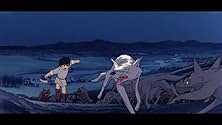Ajouter une intrigue dans votre langueA boy with a mythical sword wants to protect a Norse village from an evil ice wizard and his minions, who destroyed his family's village. However, the villagers don't fully trust him and a m... Tout lireA boy with a mythical sword wants to protect a Norse village from an evil ice wizard and his minions, who destroyed his family's village. However, the villagers don't fully trust him and a mysterious girl with a dark secret befriends him.A boy with a mythical sword wants to protect a Norse village from an evil ice wizard and his minions, who destroyed his family's village. However, the villagers don't fully trust him and a mysterious girl with a dark secret befriends him.
- Réalisation
- Scénario
- Casting principal
- Hilda
- (voix)
- Hols
- (voix)
- Villager
- (voix)
- Paul
- (voix)
- …
- Rusan
- (as Masaaki Tsusaka)
- Little girl Mauni
- (as Yoko Mizugaki)
- Coro, the little Bear
- (voix)
- (as Yukari Asai)
Avis à la une
While the impact of The Little Norse Prince resonates even in today's modern anime, as an individual film, it is a triumphant hallmark of sublime animation and an adult story with genuine heart, warmth, danger and menace that the talking squirrels of Disney's preceding '60s sword film (The Sword In The Stone) could only dream of achieving.
The originality that The Little Norse Prince exudes is nothing short of impressive, as his anti-aging formula transports us back in time to makes us feel young and vulnerable. While it may not be the greatest anime of all time, it is nothing short of being the most important.
I don't feel I need to go into the film's notoriously troubled production; other reviewers have done so with skill. But let me stress to you that if you consider yourself a fan of animation at all, you owe it to yourself to view Horus. Its musical numbers and talking animals are belied by psychological realism, a gritty sensibility, and political commentary. This isn't just a dark family film in the mode of Disney's Pinocchio (1940) or Bluth's The Secret of NIMH (1982), nor is it an "edgy" adult animation which mistakes crudity for maturity.
The film was a disappointment when first released, but its fan base grew quickly with re-releases, many of these fans being high school and college aged students who connected with the struggles of the protagonists, Horus and Hilda. In the United States, we have no equivalent to Horus as of this writing. We are still trapped by the Snow White and Toy Story model. I earnestly pray an American Takahata will one day give us a film such as this and change our animation landscape too.
I love the music to this film, I love the storyline, and the multi-faceted characters. I wish some studio would get on the ball, and get this a bit more attention.
It's a great film. And a great intro to anime before there was "anime."
Sincerely,
JThree
carolyn@dia.net
While this movie is usually heralded as an auspicious beginning for Japanese anime and Studio Ghibli, I noticed the strong influence of one of its forebears: Lev Atamanov's Snow Queen. In particular, the dark and cold Grunwald is very much like a male version of the Snow Queen, including his appearance. Horus and Hilda recall Kay and Gerda, except that here it is Hilda who is under the spell of the Snow (King). Hilda, like Gerda, is guided by a bird, this time an evil owl. I could go on, but the influence is real, and significant, as acknowledged by Miyazaki. The major difference is that, unlike the later Ghibli films (and Atamanov's Snow Queen, for example), it is the male rather than the female who is the lead.
Le saviez-vous
- AnecdotesThe production was ridden with problems, mainly due to the difficult union relationships between the artists and the company Tôei Animation (then known as Tôei Dôga). The movie was released far beyond schedule and kept in the theaters only for 10 days. Because of this, it bombed, and Isao Takahata never directed for Toei again. However, the movie became immediately an underground hit among students and young anime artists, and is now widely considered the first modern anime.
- GaffesWhen Grunwald is holding Hols' rope on the icy cliff, you can see his gloves change color from black to blue to black again.
- Citations
Hols: [after escaping from the Endless Woods and encountering Hilda] Hilda, come with me to the village.
[She steps back, clutches her amulet and glares coldly at him]
Hols: I was right, I knew we could get the other Hilda out of you. Come to the village, Hilda.
[Shaking her head, she attacks him with her sword and he fends her off with his axe]
Hols: That's the Hilda we must get out of you. Be brave and show them how human you really are.
[He disarms her and she bows her head]
Hols: There... you are human
Hilda: [Gazes sadly at him] Goodbye, Hols.
[Begins to slide into the snow darkness like a ghost]
Hols: Hilda!
Hilda: My brother went to the village... you'd better hurry to help Flep and Mauni.
Hols: Hilda...
- Versions alternativesThe English-dubbed version from AIP-TV changed the location of the film from Northern Japan to Norway.
- ConnexionsFeatured in Hana to Arisu (2004)
Meilleurs choix
- How long is Horus: Prince of the Sun?Alimenté par Alexa
Détails
- Date de sortie
- Pays d’origine
- Site officiel
- Langue
- Aussi connu sous le nom de
- Horus, Prince of the Sun
- Lieux de tournage
- Sociétés de production
- Voir plus de crédits d'entreprise sur IMDbPro
- Durée1 heure 22 minutes
- Mixage
- Rapport de forme
- 2.35 : 1
Contribuer à cette page
























